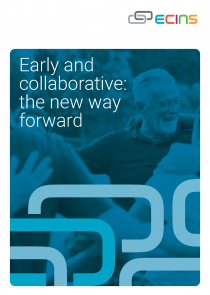Derby City Council is the first council to introduce a revolutionary approach to how they administer discretionary payments and awards. The Single Discretionary Award (SDA) Scheme has been introduced to combine three separate discretionary financial awards, Discretionary Housing Payment (DHP), Local Assistance Scheme (LAS) and Council Tax Hardship (CTH). This along with caseworker intervention supports customers to become more financially independent and take steps towards work. The SDA Gateway has been designed by social enterprise ECINS to allow customers to quickly and easily provide the council with the information required to make decisions on the financial element of the SDA application. With a number of dynamic elements, it will give customers an instant indication on the outcome of their application.
What is a Discretionary Award?
Recent welfare reform changes such as the Under-Occupancy Charge and the Benefit Cap have seen a significant increase in the number of customers presenting to the council in need of financial help. In response to this, Derby City Council developed a welfare strategy for Derby to implement innovative service interventions and partnership models to help address those impacted within the context of reducing budgets.
Customers applying to the scheme can have underlying, additional issues that are barriers to financial independence and ultimately work. These discretionary awards assist people with their rent payments, council tax payments and emergency awards for food, gas, electricity and assistance with furniture and white goods. Awards can also be made for people leaving long term hospital care or prison, people resettling after homelessness or disaster and domestic violence survivors.
Once customers have completed the SDA form, successful applicants in need of specialist support are allocated a trained caseworker who will develop their individual support plan. This plan is managed in the multi-agency case management system – ECINS. The introduction of a Single Discretionary Award has enabled the council to highlight where people have vulnerabilities in a number of different areas. Cllr Baggy Shanker, Cabinet Member for Governance and Finance, said “Our Welfare Reform Team carry out need assessments to identify the customer’s priority needs and refer them to a wide range of specialist agencies such as counselling, money advice, alcohol and drug dependency support, housing, digital skills, banking, welfare rights and employment support. Our focus is to work with customers to support them in becoming more financially independent and removing barriers to employment. “With individual discretionary awards we were less able to identify the underlying challenges that resulted in customers regularly using these short awards instead of a longer term more sustainable plan. “We are currently preparing for the full roll-out of Universal Credit and other associated welfare reforms and by introducing this service we are helping customers be better prepared.”
How does it work?
The SDA Gateway and ECINS Case Management system are used to help manage the delivery of this service. The SDA form contains a range of in-depth questions which help the council to identify the customer’s financial needs.
The process:
1. The customer accesses and completes the SDA form online.
2. The council processes the application, makes a decision and reports it in the SDA Gateway. If the council identify that a customer is in need of additional support their details are “pushed through” to ECINS where a caseworker will assess their needs and explore which agencies are best placed to support them.
3. The council generates an Excel spreadsheet from ECINS which provides data that can be imported into the ECINS Data Visualisation Tool to show emerging trends and how people have been supported to move on. This is used for evaluation purposes and to monitor success.
Gary Pettengell, CEO of ECINS, explained that the new process could also help to identify fraudulent claims. “The combination of these three forms into a single application reduces the number of times that people have to apply for separate awards, helps to maximise and coordinate support and makes it easier to identify discrepancies. This, in turn, could potentially reduce fraud by stopping applicants putting different information on each separate form. “It also enables councils to properly understand the issues each customer is facing and ensure that they are receiving all the support they’re entitled to. On an individual basis, this gets to the very heart of the problems they’re encountering.”
Derby City Council’s Director of Finance, Martyn Marples, added “The work we have achieved with ECINS in piloting the SDA Gateway could pave the way for lots of other local authorities to rethink how they administer discretionary awards. With budget cuts across all local authorities and constant pressure to reduce expenditure but increase support, the Single Discretionary Award Scheme and SDA Gateway provides us with an opportunity to help manage demand, make best use of limited funding and deliver a service to customers that helps make a difference.”


